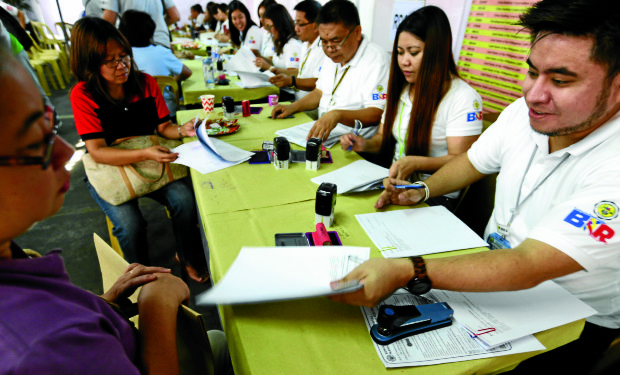Collections of BIR up 12.2% to P472.9B in Q1

Taxpayers flock to the BIR office along Quezon Avenue in Quezon Cityfor the last day and deadline of filing of income tax. EDWIN BACASMAS
The Bureau of Internal Revenue’s (BIR) tax take from its operations jumped 12.2 percent to P472.9 billion during the first three months, prompting Commissioner Caesar R. Dulay to express optimism that the country’s biggest tax-collection agency could hit its target this year.
Dulay told reporters yesterday that first-quarter collections jumped from P421.4 billion during the same three-month period last year.
The BIR exceeded its target take from operations for the January-to-March period of P361.3 billion.
Collections from BIR operations—which included taxes on net income and profits, value-added tax, excise taxes and percentage taxes, among others—accounted for the bulk or more than 90 percent of the agency’s total revenues.
The agency was also tasked to collect P14.8 billion from non-BIR operations to bring the total first-quarter target to P376.2 billion. Data on collections from non-BIR operations were not available.
Article continues after this advertisementAsked if the BIR could achieve its P1.83-trillion collections goal for 2017, Dulay said they were “hopeful” to do so.
Article continues after this advertisementDulay noted that between April 1 and 9, or ahead of Monday’s deadline to file income tax returns (ITRs), the BIR collected P11.5 billion, up 19.7 percent from the P9.6 billion during the first nine days of April last year.
For the month of April, the BIR has been programmed to collect P208 billion— P204.7 billion from operations on top of P3.3 billion from non-operations.
Monthly collections peak in April because of the ITR filing deadline.
To achieve this year’s target, which is equivalent to almost four-fifths of the government’s tax revenue program of P2.31 trillion, Dulay had said that the BIR planned to improve taxpayer compliance through the expansion of its compromise settlement program for audit cases of large taxpayers.
Also among the BIR’s priority programs for 2017 aimed at attaining the collection target included the continuous implementation of the Run After Tax Evaders (Rate) as well as “Oplan Kandado” programs; comprehensive taxpayer profiling and industry benchmarking; updating of zonal value schedules; broadening of the tax base without increasing the tax rates by registering unregistered taxpayers/businesses as a result of tax compliance verification drives and third-party information, Dulay had said.